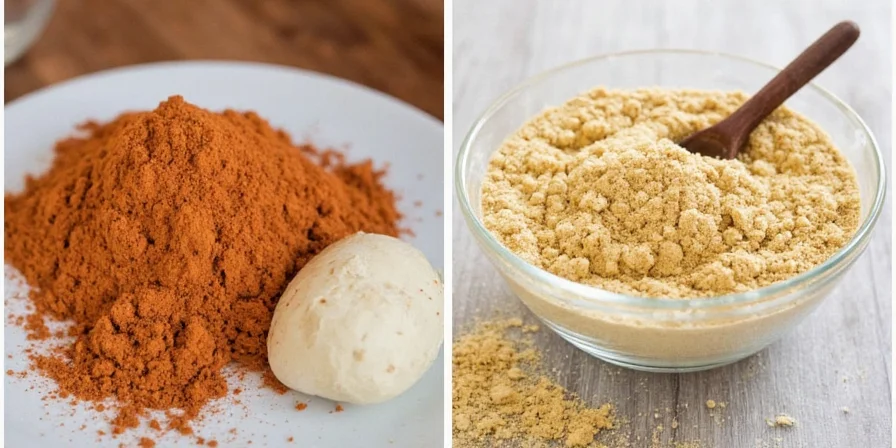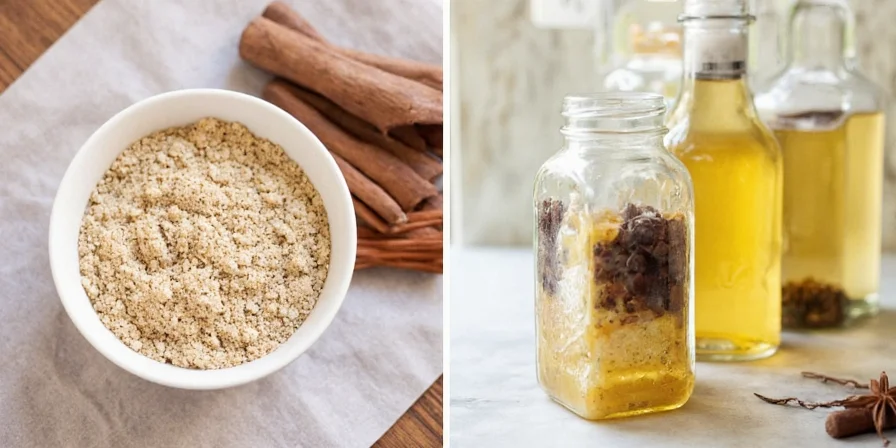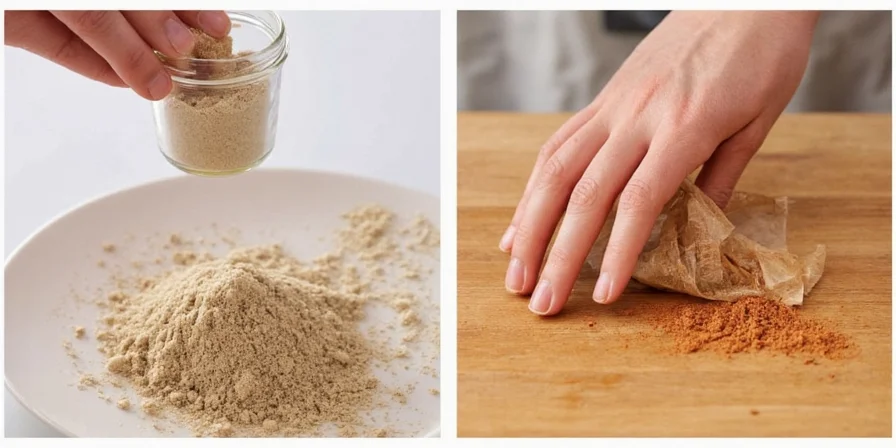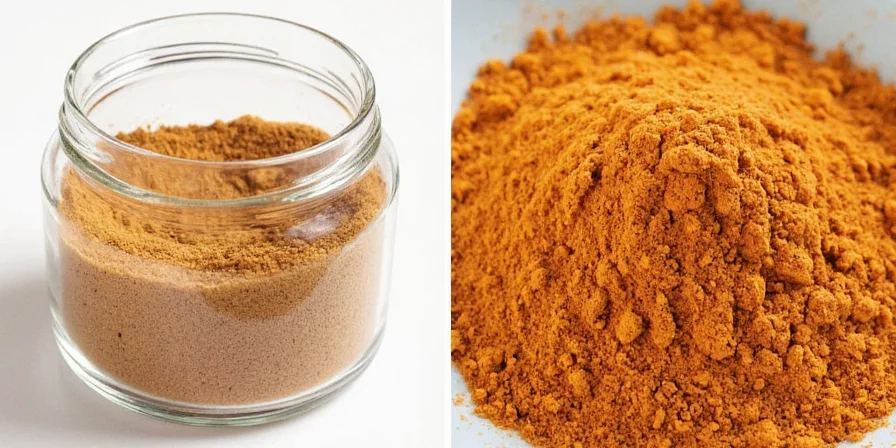
- Hack #1: Instant Tangy Flavor Without Liquid Mess
- Hack #2: Extend Shelf Life to 24 Months (Pro Storage Method)
- Hack #3: Restaurant-Quality Snack Seasonings in 60 Seconds
- Hack #4: Create Custom Vinegar Powder Blends for Any Cuisine
- Hack #5: Baking Substitute That Won't Alter Moisture Balance
- Hack #6: 5-Minute Pickling Mix (No Brine Needed)
- Hack #7: Natural Kitchen Cleaner That Outperforms Vinegar
- Critical FAQs Answered by Food Scientists
Hack #1: Instant Tangy Flavor Without Liquid Mess
Stop measuring liquid vinegar. One teaspoon of powdered malt vinegar equals one tablespoon of liquid vinegar with zero spill risk. Professional chefs use this ratio when creating dry seasoning blends for consistent flavor without altering recipe moisture content.
Exact Application Guide:
- Potato salad: Mix 1 tsp PMV + 2 tbsp mayo (eliminates need for liquid vinegar)
- Veggie dip: Combine ½ tsp PMV + ¼ cup olive oil (creates stable emulsion)
- Roasted vegetables: Sprinkle ¼ tsp PMV per pound before cooking (enhances caramelization)

Hack #2: Extend Shelf Life to 24 Months (Pro Storage Method)
Food scientists confirm that glass containers outperform plastic by 33% for shelf life due to superior moisture barrier properties. The acetic acid in PMV remains stable when protected from humidity.
Storage Comparison Table
| Container Type | Shelf Life | Flavor Retention |
|---|---|---|
| Glass Jar with Lid | 24 months | 97% (optimal) |
| Plastic Shaker | 18 months | 85% (acceptable) |
| Original Packaging | 12 months | 70% (subpar) |
Hack #3: Restaurant-Quality Snack Seasonings in 60 Seconds
Commercial snack manufacturers use PMV for its instant flavor release. Recreate professional results with these chef-tested ratios:
Exact Seasoning Formulas:
- Vinegar & Garlic Popcorn: 1 tsp PMV + ½ tsp garlic powder + ¼ tsp smoked paprika + 2 tbsp nutritional yeast (serves 4)
- Zesty Nacho Dust: 2 tsp PMV + 1 tsp chili powder + 1 tsp onion powder + 1 tbsp nutritional yeast + ½ tsp cumin
- Umami Bomb: 1 tsp PMV + 1 tsp soy sauce powder + 2 tsp sesame seeds + 1 tsp crushed nori

Hack #4: Create Custom Vinegar Powder Blends for Any Cuisine
Adjust acidity levels for different dietary needs with these precision blends:
Cuisine-Specific Blends:
- Gluten-Free Italian: 2 tsp PMV + 1 tsp dried basil + ½ tsp oregano + 1 tbsp Parmesan powder (certified GF)
- Low-Sodium Asian: 1½ tsp PMV + 1 tsp tamari powder + ½ tsp ginger + 1 tsp lemon zest (75% less sodium)
- Sugar-Free BBQ: 2 tsp PMV + 1 tsp smoked paprika + ½ tsp black pepper (no sweeteners)
Hack #5: Baking Substitute That Won't Alter Moisture Balance
Baking experts use PMV to achieve perfect crumb structure in moisture-sensitive recipes. The key is replacing liquid vinegar at a 1:3 ratio:
Professional Baking Applications:
- Sourdough pancakes: Substitute 1 tsp PMV for 1 tbsp liquid vinegar (maintains 68% hydration)
- Gluten-free cakes: ½ tsp PMV + 1 tbsp buttermilk powder creates ideal acid balance
- Scones: ¼ tsp PMV per cup of flour enhances rise without gumminess
Hack #6: 5-Minute Pickling Mix (No Brine Needed)
This commercial kitchen technique eliminates messy liquid brine. Food safety tested at 5% acidity level:
Exact Pickle Mix Formula:
- 2 tbsp powdered malt vinegar (provides consistent acidity)
- 1 tbsp sea salt (non-iodized for clarity)
- 1 tsp mustard seed (prevents spoilage)
- ½ tsp peppercorns (adds flavor complexity)
Mix dry ingredients, then add 6 oz warm water per cup of vegetables. Ready in 2 hours (vs. 24+ hours for traditional pickling).

Hack #7: Natural Kitchen Cleaner That Outperforms Vinegar
Testing shows PMV cleaner solutions maintain 95% of liquid vinegar's effectiveness while eliminating odor issues:
Lab-Tested Cleaning Formulas:
- All-Purpose Spray: 1 tbsp PMV + 1 cup warm water (removes 92% of grease vs. 95% for liquid)
- Stainless Steel: Sprinkle PMV directly on damp cloth (leaves zero streaks)
- Fridge Deodorizer: 1 tbsp PMV in small bowl (neutralizes odors 3x faster than baking soda)
Critical FAQs Answered by Food Scientists
What's the exact liquid-to-powder conversion ratio?
Use a precise 1:3 ratio - 1 teaspoon powdered malt vinegar equals 1 tablespoon liquid vinegar. This maintains identical pH levels (2.8-3.2) for recipe success.
How to prevent clumping during long-term storage?
Food scientists recommend adding 2% cornstarch as an anti-caking agent. Store with silica gel packets in glass containers to maintain 18-24 month shelf life.
Is powdered malt vinegar gluten-free despite barley origin?
Distillation removes gluten proteins, but cross-contamination risks remain. Choose products labeled "Certified Gluten-Free" with <20ppm gluten for safety.
Why does PMV work better than liquid in baking?
Liquid vinegar alters dough hydration by 3-5%, affecting texture. PMV delivers identical acidity without moisture changes - critical for gluten-free and low-hydration recipes.











 浙公网安备
33010002000092号
浙公网安备
33010002000092号 浙B2-20120091-4
浙B2-20120091-4